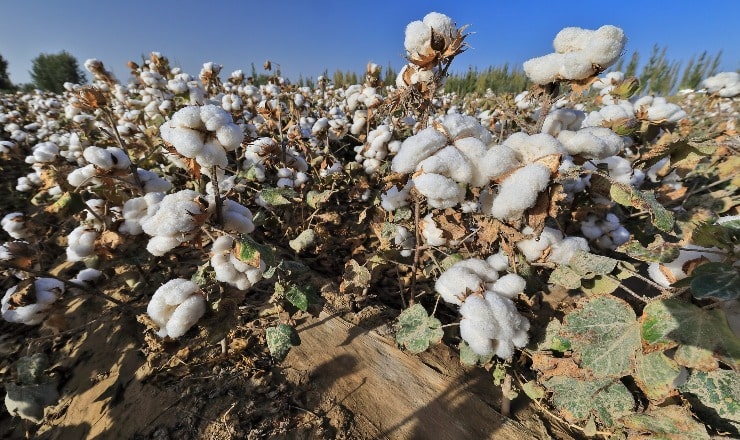
Two weeks ago, Sheffield Hallam University published a momentous report showing that international fashion brands, including UK companies, are very likely to be selling products made with the forced labour of Uyghurs. As a member of the Coalition to End Forced Labour in the Uyghur Region we have responded and are calling on the government to force UK businesses to take responsibility. We don’t just want the government to mandate businesses to act, we want them to level the playing field so that it is in all businesses’ interests to eradicate exploitation from their supply chains and victims of abuses can access justice.
Nobody wants to buy products made off the backs of torture and forced labour of Uyghurs. As consumers, we shouldn’t bear the responsibility to try and assess the ethics and sustainability of every product we buy. Instead, the UK government should be making sure that UK businesses are acting responsibly, and taking all the steps they can to prevent Uyghur forced labour, and all abuses, in their supply chains.
Yet, we anticipate that the UK government is likely to respond with the same tired lines that it has used in regard to Uyghur forced labour in supply chains: that the UK is showing global leadership on this issue by requiring companies to comply with the UK Modern Slavery Act.
They might also say that it’s too hard for businesses to track their supply chains and rule out forced labour. However, this report tracked shipping data and detailed, link by link, how cotton from the Xinjiang Uyghur Autonomous Region is very likely to make its way onto shop shelves around the world. This shows that it is possible to track even through opaque supply chains. Companies should be doing this themselves.
While pioneering at the time of its introduction in 2015, the Modern Slavery Act has not achieved meaningful industry-wide action to address modern slavery in supply chains. Although there have been pockets of action, some industry initiatives, and an improved general awareness on modern slavery in supply chains, many companies are taking a “tick-box” compliance approach. Companies can comply with this law as long as they can afford to hire a lawyer who can produce a “modern slavery statement” in line with government requirements. As a tool to address Uyghur forced labour in supply chains, it cannot drive the change we need to see.
What could the government do instead? For over a year, Anti-Slavery International, along with other civil society groups in the UK, has been calling for the government to move beyond the Modern Slavery Act and introduce a stronger, overarching law. A law that would hold companies accountable for a failure to prevent modern slavery, other human rights abuses and environmental harm in their business and supply chains (a process called human rights and environment due diligence) and make sure victims of corporate harm can access remedy and justice.
Many businesses themselves are even calling for a due diligence law. In October, leading UK business names like ASOS, Liberty London, Aviva, John Lewis, Primark and others wrote an open statement calling for the UK government to introduce “mandatory human rights and environmental due diligence”. These companies recognise the benefits that binding laws with uniform standards can bring to themselves, to consumers, to workers and communities.
These laws would protect workers all around the world, including in the UK and would mean companies would be compelled to map their supply chains, to find – as Sheffield Hallam has done – the risk of Uyghur forced labour in their supply chains and take action in response. It would also create a level-playing field for businesses, by making sure those companies that act responsibly are not competitively undercut by those with utter disregard for people and the planet. It would also mean that consumers could have far more confidence about the ethical standards of the products they buy.
However, the government continues to reject these proposals for stronger approaches. As recently as a week ago, the UK government, on the whole, rejected a series of recommendations by the UK Parliament’s Foreign Affairs Committee on how to strengthen the UK’s response to act on the atrocities in the Uyghur Region. This included a recommendation to move beyond the UK Modern Slavery Act to introduce a law requiring companies to take concrete measures to prevent and remove the use of forced labour in their value chains.
In October too, the government rejected a formal petition by a UK civil society group and a Uyghur group for the UK National Crime Agency to investigate UK companies for knowingly importing cotton produced by forced labour, under the UK Proceeds of Crime Act. The National Crime Agency has essentially argued that as long as companies pay good money for it, they can source as much forced labour cotton as they like. The petitioners are now taking the UK government to court.
What will it take to move the UK government beyond its current position? The crisis faced by Uyghurs has not pushed the government to act, so it is hard to say what will. Following a year where the UK has chaired the G7 and COP26 we hope that some of the commitments the UK has won will help garner more ambitious action. We need laws that can hold businesses to account and provide access to justice for victims of abuses. There are strong incentives for the government to implement more robust legislation on business human rights and this recent report underscores more than ever why we need strong leadership from the government. Whatever the reason, the time for action is long over-due.




